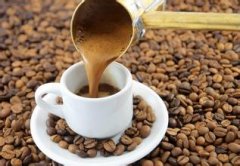The Origin and Development History of Fine Coffee beans in the Yega Fischer Manor in Ethiopia

These mountain villages are foggy, spring all year round, cool but not hot in summer, rain but not damp in winter, and they breed unique regional flavors of citrus and flowers. Coffee trees are mostly grown in farmers 'backyards or mixed with other crops in the field. Yegashefi is a sub-producing area in Sidamo Province, Ethiopia. It is located in the northwest of Sidamo Province and is one of the highest coffee producing areas in Ethiopia. However, the production method and flavor here are so prominent that Ethiopian coffee farmers compete to be proud of their own coffee with Yegashefi flavor, so they are independent from the West Damo production area and become the most famous production area in Africa.
Initially, Yegashefi's coffee trees were cultivated by European monks (a bit like Belgian monks growing wheat to brew beer), but later by farmers or cooperatives. Yerga Shefi is actually constructed by surrounding coffee communities or cooperatives, including Idido, Harfusa, Hama, and Biloa near Misty Valley, all washed, but a small number of unique beans are deliberately sunburned to enhance the charming fruity flavor and body. These mountain villages are foggy, spring all year round, cool but not hot in summer, rain but not damp in winter, and they have a unique regional flavor of citrus and flowers. Coffee trees are mostly planted in farmers 'backyards or mixed with other crops in the field. The yield per household is not much. It is a typical pastoral coffee. The Yejia Shefei award-winning beans are almost from the above coffee villages and communities
Ethiopia's Yirgacheffe coffee is petite, but gentle and sweet. As the home of coffee, Ethiopia's millennia of growing and processing traditions have resulted in high-quality washed Arabica beans. Light baked with unique lemon, floral and honey sweet aromas, soft fruit acids and citrus notes, fresh and bright taste. No milk, no sugar, let the rich texture and unique soft floral brush your taste buds, leaving endless aftertaste…
Yegashefi is a small town, 700-2100 meters above sea level, synonymous with Ethiopian fine coffee. It is a wetland since ancient times, and the old saying "Yirga" means "settle down" and "Cheffe" means "wetland". The way coffee is produced and the flavor is so prominent that Ethiopian coffee farmers compete to be proud of their coffee with the flavor of Yegashfi, which has become Africa's most famous coffee producing area. Yega Shefi is the name of a local town. The altitude ranges from 1700 to 2100 meters. Yirga cheffe is a small town in Ethiopia, 1700-2100 meters above sea level, is also synonymous with Ethiopian fine coffee, here is a wetland since ancient times, the old saying "Yirga" means "settle down","cheffe" means "wetland", therefore, Yirga cheffe means "let us settle down in this wetland".
Strictly speaking, Yejia Shefei is a sub-producing area in Sidamo Province of West Damo, Ethiopia. It is located in the northwest of Sidamo and is one of the highest coffee producing areas in Ethiopia. However, the production method and flavor here are so prominent that Ethiopian coffee farmers compete to be proud of their own coffee with Yegashefi flavor, so they are independent from the West Damo production area and become the most famous production area in Africa.
The mountain villages in the Yega Shefi region are cool and foggy, spring all year round, cool but not hot in summer, rainy but not damp in winter, and the best environment for planting Arabica. There are no large coffee plantations here. Coffee farmers grow coffee mixed with other crops, usually under banana trees, forming a unique landscape. Ethiopia's traditional sun treatment method is rough and heavy, which is criticized by people. In 1959, Yejia Shefei production area introduced South American washing treatment method, most production areas are generally used washing treatment, that is, coffee fruit peeling, fermentation, washing process after removing pectin layer, and then drying.
Since 2006, some coffee processing plants in some producing areas have adopted exquisite overhead solarization, which involves intensive manual labor to isolate the coffee fruit from contact with the ground and prevent the dirt from being produced in the process of solarization, creating an unusually clean fruit flavor. After more than two weeks of sun exposure, the dark brown coffee cherries are professionally stored, waiting for the full flavor to ripen. Before sale, the dried cherry pulp and sheepskin are removed, and then the immature beans and overfermented beans are eliminated. Strict control greatly improves the quality of the sun-dried beans.
In September 1974, a group of young officers formed the "Military, Police and Local Army Coordination Committee"(DERGUE, English SHADOW, later referred to the military government and Mengistu regime) to launch a military coup, overthrow Haile Selassie government, announce the end of the monarchy, and establish a "provisional military government." In November, the term "Interim Military Government" was changed to "Interim Military Administrative Council." In December, the Interim Military Administrative Council declared Ethiopia a "socialist state" and nationalized land, financial institutions and industry. In February 1977, Lieutenant Colonel Mengistu Haile Mariam launched a military coup and served as Chairman of the Interim Military Administrative Council and Head of State. In 1979, the "Ethiopian Working People's Party Organizational Committee" was established with military personnel as the main body, and a one-party system was implemented. In 1984, the "Ethiopian Workers 'Party" was formed according to the Soviet Communist Party model. In September 1987, Mengistu announced the dissolution of the Provisional Military Administrative Council, the end of military rule, the establishment of the People's Democratic Republic of Ethiopia, and the establishment of a new parliament, Mengistu as president and head of government.
In March 1988, the rebel Eritrea People's Liberation Front (EPLF) and Tigray People's Liberation Front (TPLF) launched an attack on government forces, and a large-scale civil war broke out. In 1989, the "Eritrea People's Liberation Front" occupied most of Eritrea. On May 28, 1991, the EPRF army dominated by the "Tigray People's Liberation Front" entered Addis Ababa, and the Mengistu regime was declared collapsed.
Ethiopia's Yirgacheffe coffee is petite, but gentle and sweet. As the home of coffee, Ethiopia's millennia of growing and processing traditions have resulted in high-quality washed Arabica beans. Light baked with unique lemon, floral and honey sweet aromas, soft fruit acids and citrus notes, fresh and bright taste. No milk, no sugar, let the rich texture and unique soft floral brush your taste buds, leaving endless aftertaste…
Yegashefi is a small town, 700-2100 meters above sea level, synonymous with Ethiopian fine coffee. It is a wetland since ancient times, and the old saying "Yirga" means "settle down" and "Cheffe" means "wetland". The way coffee is produced and the flavor is so prominent that Ethiopian coffee farmers compete to be proud of their coffee with Yegashfi flavor, which has become Africa's most famous coffee producing area.
At first, the coffee trees in Yegashefi were planted by European monks, but later by farmers or cooperatives. Yegashefi is actually formed by surrounding coffee communities or cooperatives, which generally include: Hafusa, Hama, and Biloa.
Important Notice :
前街咖啡 FrontStreet Coffee has moved to new addredd:
FrontStreet Coffee Address: 315,Donghua East Road,GuangZhou
Tel:020 38364473
- Prev

Fruity and citrus flavor of boutique coffee beans in Ethiopia's Yega Ficher Manor.
At first, Yejassefi's coffee trees were planted by European monks, and later by farmers or cooperatives. Yega Xuefei is actually constructed by the surrounding coffee communities or cooperatives, including: Hafusha, Hama, Biloya. These mountain villages are foggy, like spring all the year round, with a gentle breeze in summer, cool but not hot, rain but not damp, and no cold damage in winter.
- Next

A brief introduction to the Market Price of Fine Coffee Bean varieties in the fresh and bright Yega Fischer Manor
Although the Ethiopian Yirgacheffe coffee is petite, it is gentle and delicate and sweet. As the hometown of coffee, thousands of years of planting history and processing tradition in Ethiopia have created high-quality washed Arabica beans. Light baking has unique sweet aromas of lemon, flowers and honey, soft acidity and citrus flavors, fresh and bright on the palate. No.
Related
- Does Rose Summer choose Blue, Green or Red? Detailed explanation of Rose Summer Coffee plots and Classification in Panamanian Jade Manor
- What is the difference between the origin, producing area, processing plant, cooperative and manor of coffee beans?
- How fine does the espresso powder fit? how to grind the espresso?
- Sca coffee roasting degree color card coffee roasting degree 8 roasting color values what do you mean?
- The practice of lattes: how to make lattes at home
- Introduction to Indonesian Fine Coffee beans-- Java Coffee producing area of Indonesian Arabica Coffee
- How much will the flavor of light and medium roasted rose summer be expressed? What baking level is rose summer suitable for?
- Introduction to the characteristics of washing, sun-drying or wet-planing coffee commonly used in Mantenin, Indonesia
- Price characteristics of Arabica Coffee Bean Starbucks introduction to Manning Coffee Bean Taste producing area Variety Manor
- What is the authentic Yega flavor? What are the flavor characteristics of the really excellent Yejasuffi coffee beans?

